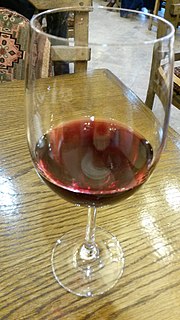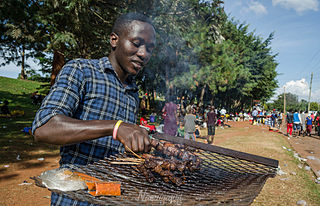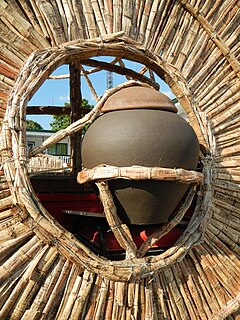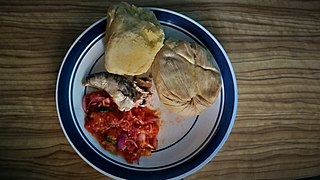Related Research Articles

Kombucha is a fermented, lightly effervescent, sweetened black or green tea drink commonly consumed for its purported health benefits. Sometimes the beverage is called kombucha tea to distinguish it from the culture of bacteria and yeast. Juice, spices, fruit or other flavorings are often added.

Chicha is a fermented (alcoholic) or non-fermented beverage of Latin America, emerging from the Andes and Amazonia regions. In both the pre- and post-Spanish conquest periods, corn beer made from a variety of maize landraces has been the most common form of chicha. However, chicha is also made from a variety of other cultigens and wild plants, including, among others, quinoa, kañiwa, peanut, manioc, palm fruit, rice, potato, oca, and chañar. There are many regional variations of chicha. In the Inca Empire, chicha had ceremonial and ritual uses.

Fruit wines are fermented alcoholic beverages made from a variety of base ingredients ; they may also have additional flavors taken from fruits, flowers, and herbs. This definition is sometimes broadened to include any alcoholic fermented beverage except beer. For historical reasons, mead, cider, and perry are also excluded from the definition of fruit wine.

Makgeolli, sometimes anglicized to makkoli, is a Korean alcoholic beverage. The milky, off-white, and lightly sparkling rice wine has a slight viscosity that tastes slightly sweet, tangy, bitter, and astringent. Chalky sediment gives it a cloudy appearance. As a low proof drink of six to nine percent alcohol by volume, it is often considered a "communal beverage" rather than hard liquor. In Korea, makgeolli is often unpasteurized, and the wine continues to mature in the bottle. Because of the short shelf life of unpasteurized "draft" makgeolli, many exported makgeolli undergo pasteurization, which deprives the beverage of complex enzymes and flavor compounds. Recently, various fruits such as strawberries and bananas are added to makgeolli to drink in new forms.

Tempoyak, asam durian or pekasam is a Malay condiment made from fermented durian. It is usually consumed by the ethnic Malays in Maritime Southeast Asia, notably in Indonesia and Malaysia. Tempoyak is made by taking the flesh of durian and mixing it with some salt and kept in room temperature for three or five days for fermentation. Tempoyaks are usually made during the durian season, when the abundance of durian and excess production are made into fermented tempoyak.

Purposeful production of alcoholic drinks is common and often reflects cultural and religious peculiarities as much as geographical and sociological conditions.

Ugandan cuisine consists of traditional and modern cooking styles, practices, foods and dishes in Uganda, with English, Arab, and Asian influences.

Waragi is a generic term in Uganda for domestic distilled beverages. Waragi is also given different names, depending on region of origin, the distillation process, or both. Waragi is known as a form of homemade Gin. The term "Waragi" is synonymous with locally distilled gin in all parts of Uganda. However, Uganda Waragi is a particular brand of industrially distilled gin produced by East African Breweries Limited. Other brands of distilled gin which are done by individuals at small scale are also available, but they are also unique and different from each other. The most common are: 1. "Kasese-Kasese" which was originally distilled in the district of Kasese in western Uganda and sold all over the country; 2. "Lira-Lira" which first originated in Lira district in northern Uganda and sold all over the country as well. These two brands "waragi" have different tastes and scents from each other. The distillation process in both cases produce highly distilled gin at the level produced industrially.

Tapai is a traditional fermented preparation of rice or other starchy foods, and is found throughout much of Southeast Asia, especially in Austronesian cultures, and parts of East Asia. It refers to both the alcoholic paste and the alcoholic beverage derived from it. It has a sweet or sour taste and can be eaten as is, as ingredients for traditional recipes, or fermented further to make rice wine. Tapai is traditionally made with white rice or glutinous rice, but can also be made from a variety of carbohydrate sources, including cassava and potatoes. Fermentation is performed by a variety of moulds including Aspergillus oryzae, Rhizopus oryzae, Amylomyces rouxii or Mucor species, and yeasts including Saccharomyces cerevisiae, and Saccharomycopsis fibuliger, Endomycopsis burtonii and others, along with bacteria.

Tongba is a Limbu millet-based alcoholic beverage found in the eastern mountainous region of Nepal and the neighbouring Darjeeling and Sikkim. It is the traditional and indigenous drink of the Limbu people as well as people of other Kirati communities and many other ethnic group of Nepal. Tongba is culturally and religiously important to the Limbu people. Taplejung is the ultimate destination for drinking Tongba. Offering Tongba is a symbol of respect to a guest among the Limbu people and also an important drink for special occasions and festivals.

Basi is a native Ilocano fermented alcoholic beverage or wine made with sugarcane juice, particularly those produced in the region of Northern Luzon particularly in Ilocos Region. This wine is processed in “burnay” or “tapayan”.

Kenkey is a staple dish similar to sourdough dumpling from the Ga and Fante-inhabited regions of West Africa, usually served with pepper Crudaiola and fried fish or soup, stew.

An alcoholic drink is a drink that contains ethanol, a type of alcohol produced by fermentation of grains, fruits, or other sources of sugar that acts as a drug. The consumption of alcoholic drinks, often referred to as "drinking", plays an important social role in many cultures. Most countries have laws regulating the production, sale, and consumption of alcoholic beverages. Regulations may require the labeling of the percentage alcohol content and the use of a warning label. Some countries ban such activities entirely, but alcoholic drinks are legal in most parts of the world. The global alcoholic drink industry exceeded $1 trillion in 2018.

Banana beer is an alcoholic beverage made from fermentation of mashed bananas. Sorghum, millet or maize flour are added as a source of wild yeast.

The cuisine of Rwanda is based on local staple foods produced by the traditional subsistence-level agriculture and has historically varied across different areas.

Banana wine is a fruit wine made exclusively from bananas.

Bicyclus smithi, or Smith's bush brown, is a butterfly in the family Nymphalidae. It is found in Nigeria, Cameroon, Equatorial Guinea, Angola, the Democratic Republic of the Congo, Uganda, Kenya and Tanzania. The habitat consists of lowland forests.
Also known as Kpete, Kwete is the alcoholic beverage brewed particularly by the Lugbara people of Uganda and DR Congo. The production process involves mixing fermented sorghum, millet or maize, malt, boiled water and yeast which is locally called Aku fi.
Khao mak, also known as "Thai fermented sweet rice dessert", is a Thai dessert. The sticky rice used to prepare khao mak is fermented for several days, resulting in an alcohol content of just over one percent. It has a noticeable alcohol flavor with a sweet taste and is often packaged in banana leaves.
References
Global Status Report on Alcohol 2004, World Health Organization, 2004.
